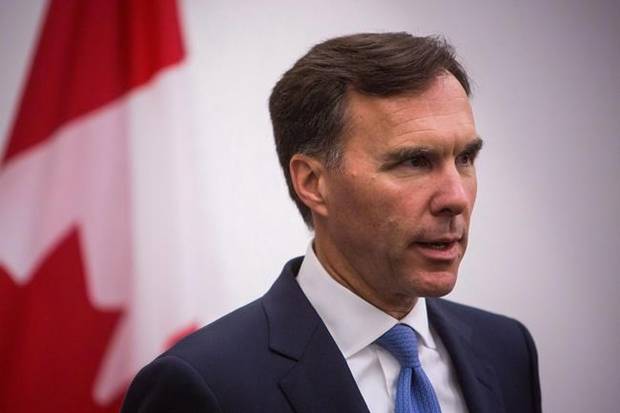Briefing highlights
- Small businesses grapple with rates, taxes
- Markets at a glance
- Toys “R” Us files for bankruptcy protection
- Manufacturers suffer second straight hit
Canada's small-business owners can't catch a break.
Certainly not a tax break, by the look of things. And not likely one from the bank, either.
And those are just two of the weighty issues on Mr. Kelly's mind as small businesses across the country grapple with proposed federal tax changes, higher interest rates and a host of other matters with a cumulative impact.
Let's start with taxes, which Mr. Kelly and his CFIB members are fighting.
As The Globe and Mail's Bill Curry has chronicled, Ottawa is proposing changes to small-business tax rules governing incorporation, income-splitting, business investment and the like.
This comes at the same time as the Bank of Canada is raising interest rates, twice now with more to come.
For entrepreneurs and other small-business owners, there's a double impact: There's not only the business side of borrowing, but also the personal side, just like the rest of us. By necessity, these are men and women who borrow.
"This will absolutely have an effect on access to financing and the cost of financing," said Mr. Kelly, who represents more than 100,000 business owners in Canada.
"There will be a broad effect on small businesses from higher interest rates, and a negative one, for the most part," he added in an interview.
Banks may have special small-business lending programs, but a spike in rates is a spike in rates.
While some owners may enjoy a fixed rate, others have business lines of credit whose rates are variable. Small businesses are also "significant users" of credit cards, Mr. Kelly noted. There can also be property loans, so all in all "financing is absolutely a reality."
And sometimes, he added, the personal and the business sides mix, for example when the owner of a startup borrows against personal holdings. Or when, in the early stages, expenses go to a personal credit card.

Dan Kelly, president of the Canadian Federation of Independent Business.
Tim Fraser/For The Globe and Mail
Depending on the business, expect added pressure from a pullback by consumers struggling to keep their own debts in check. As last week's report from Statistics Canada showed, families were juggling a record high credit burden – debt to income at 167.8 per cent in the second quarter – even before the central bank raised rates.
"Going forward, the spending environment – for consumers, businesses and governments – will become more challenging in light of the recent interest rate hikes by the Bank of Canada," said Toronto-Dominion Bank economist Dina Ignjatovic.
Indeed, added Royal Bank of Canada economist Laura Cooper, "the sharp rise in consumer credit balances leading up to the Bank of Canada's rate hikes in July and September indicates financial pressure on households' pocket books will intensify."
This all comes, too, amid increases in minimum wages in some regions. That's not to suggest minimums shouldn't rise, only that business will also have to adjust to them.
"Anything Ottawa does also has to be taken in the context of the Bank of Canada entering into a new regime of higher interest rates, and coupled with that a 13-per-cent surge in the Canadian dollar in the past several months, perhaps helping pull down import costs, which is a positive but still a shock to exports and a clear hit to our cost competitiveness," said David Rosenberg, chief economist at Gluskin Sheff + Associates.
"Tack on the planned minimum-wage hikes in Ontario … Alberta and B.C., and one can envisage some really tough times ahead for the small-business entrepreneur."
The Liberals say this is all part of their pledge to boost taxes on higher-income earners, thus helping those at in the middle and at the bottom.
Mr. Rosenberg doesn't see it that way.
"How can you claim to be the party of small business, to have made so much noise over the need to promote entrepreneurship, and then invoke changes to the tax system that will remove the tax incentives to actually take on the risk of being a small business operator," he said in a recent report.

Finance Minister Bill Morneau
Ben Nelms/The Canadian Press
The proposed tax changes also have their backers. On Monday, for example, a coalition including Oxfam Canada, organized labour groups and others released a statement in support, saying the "private corporation loopholes that the government aims to close largely benefit the wealthy and create significant inequities in our tax system."
Similarly, a group of doctors and med students issued an open letter to Finance Minister Bill Morneau, also in support.
"Some physicians have argued that these tax mechanisms are provided in lieu of benefits or to compensate for high student debt and long training periods," the group said.
"We suspect that these concerns, as well as increasing rates of burnout and inequities between physician payment models, are also contributing to the majority response – one of opposition to the changes – thus far," it added.
"However, we feel that these issues are best addressed at their root with the best available policy solutions and not in inherently unstable ways through a tax system that is constantly evolving."
Whether you believe this specific plan is good or bad, it's still one of the balls the small-business sector is trying to juggle.
Many small businesses are worried, and don't know what to do given the uncertainty of today.
Indeed, business owners also face changes in labour legislation, depending on their location, higher employment insurance and CPP premiums, carbon taxes and the "natural uncertainties" of renegotiating the North American free-trade agreement, the CFIB's Mr. Kelly said.
Whether or not the CFIB opposes or approves of certain measures, federal and provincial governments look at those changes as individual ones, thus ignoring the cumulative impact, he added.
"That's a pretty big matzoh ball the governments are throwing at the business community right now. And I'm very worried about it."
Read more
- Bill Curry: Small-business tax fight dominates Parliament’s return
- Campbell Clark: Liberal MPs’ reactions to small-business tax plan show party’s pitch is falling flat
- Alexandra Posadzki, Eric Atkins, David Parkinson: Small business, big trouble
- Ian McGugan: Canada’s tax system needs a proper overhaul
- David Rosenberg: Small-business tax changes could tip economy into recession
Markets at a glance
Read more
Toys "R" us seeks protection
The company that brought the world "R" Us has collapsed into bankruptcy protection.
The once-mighty Toys "R" Us chain filed for Chapter 11 proceedings in the United States and plans to follow suit under similar provisions in Canada.
"The company's approximately 1,600 Toys "R" Us and Babies "R" Us stores around the world - the vast majority of which are profitable - are continuing to operate as usual," the chain said in a statement, adding it intends to use court proceedings "to restructure its outstanding debt and establish a sustainable capital structure."
Read more
The Canadian manufacturing has felt the pain
Nick Exarhos, CIBC World Markets
Factory sales tumble
Canada's manufacturers are having a tough go of it, with sales down 2.6 per cent in July after June's 1.9-per-cent tumble.
July's drop was largely because of a setback in autos and auto parts. If you strip that out, sales inched up 0.2 per cent, Statistics Canada said today.
Sales fell in nine of 21 industries, accounting for 57 per cent of the group, the agency said.
"It's been a rough two months for exports, and the Canadian manufacturing sector has felt the pain," said CIBC's Mr. Exarhos.
"The year-to-date gains in the factory sector have now been reversed, giving reason for pause to those who would bid up the Canadian dollar much further, or price in a too aggressive path of tightening from the Bank of Canada from here," he added.